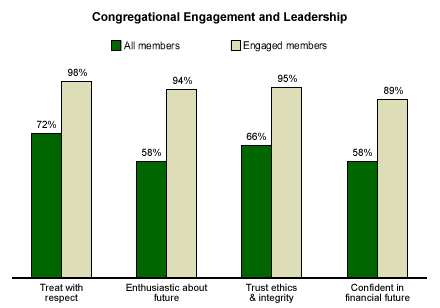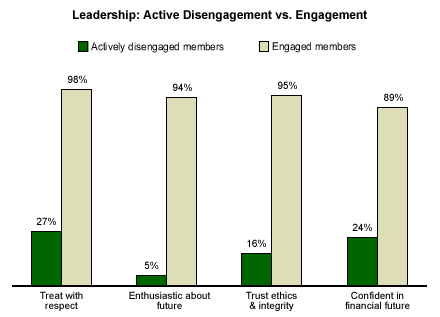║┌┴╧═Ї's annual survey of congregational engagement* shows that by and large, most congregation members are satisfied with the leadership of their faith communities. On the whole, members gave high marks when asked how much respect their leaders show them, how enthusiastic their leaders make them feel about the future, how much they trust their leaders' ethics and integrity, and how confident they are in the financial future of their congregations (see "Leadership: What Matters Most to Congregations?" in Related Items).
A closer look at these results reveals that members' trust in their spiritual leaders and their confidence in the future of their congregations vary widely according to their level of engagement with the congregation.
║┌┴╧═Ї research has shown how important "engaged" members are to a congregation's overall spiritual health (see "Congregational Engagement Stable Amid Turmoil" in Related Items). When compared with members who are "not engaged" or "actively disengaged," engaged members are more likely to invite others to participate in their congregations, serve more hours volunteering in their communities, give more money to their congregations, and have a higher level of life satisfaction. The newest research suggests that engagement is also linked to members' views of their congregational leadership.
When compared with all members of congregations, engaged members are more likely to "strongly agree" that:
- Their leaders always treat them with respect (98% for engaged members, 72% for all members).
- Their leaders make them enthusiastic about the future (94% to 58%).
- They trust the ethics and integrity of their leaders (95% to 66%).
- They are confident in the financial future of their congregations (89% to 58%).

An inverse relationship appears with congregation members who are actively disengaged. Actively disengaged members are either apathetic to the extreme (rarely showing up for or participating in congregational events), or openly and vocally unhappy with their congregations. When compared with engaged members, they are far less likely to invite others, they give minimal (or no) time and financial resources, and they are much less likely to be satisfied with their lives. They also have a more negative view of leadership:
- 27% strongly agree that their leaders treat them with respect.
- 5% strongly agree that their leaders make them enthusiastic about the future.
- 16% strongly agree that they trust the ethics and integrity of their leaders.
- 24% strongly agree that they are confident in the financial future of their congregations.

Bottom Line
Which comes first -- the chicken or the egg? Is a positive view of the leadership of one's congregation influenced by engagement, or does engagement in one's congregation result in a positive view of leadership? In this case, it is likely that both are correct. Effective leaders will focus on creating an environment that leads to increasing the engagement of their members. This fosters a virtuous cycle in which engaged members are more likely to have a positive view of their congregations' leaders.
One important action leaders can take to "raise their stock" in their congregations is to help their members discover what they do best, and provide ways for the members to live out those strengths. Ninety-one percent of members who "strongly agree" that they regularly have the opportunity to do what they do best in their congregations also strongly agree that their leaders always treat them with respect. Similarly, among this group of members who strongly agree that they get to do what they do best, 81% feel that their leaders make them enthusiastic about the future, 86% say they trust their leaders' ethics and integrity, and 77% are confident in the financial future of their congregations.
The data appear to confirm what effective leaders know intuitively: Leadership is about empowering and equipping others to build a more positive future.
*Results are based on telephone interviews with 1,000 adult members of a church, synagogue, or other religious faith community, aged 18 and older, and 500 nonmembers, conducted in October and November 2003. For results based on this sample, one can say with 95% confidence that the margin of sampling error is ±2.6 percentage points.
